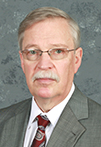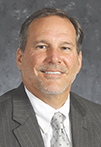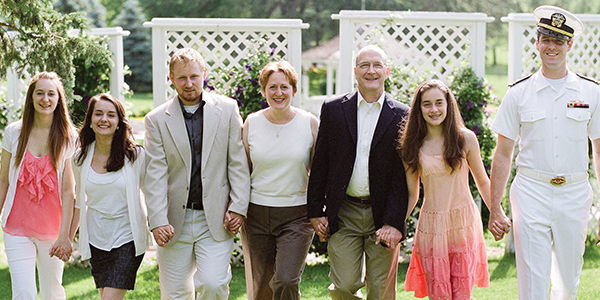By PATRICIA CORRIGAN
Suicide is the 10th leading cause of death in the U.S. and, according to the National Center for Health Statistics, the suicide rate is at a 30-year high. South Dakota ranks seventh in the number of suicides.
Avera Health and the Helpline Center, both in Sioux Falls, are embracing the goal proposed by Zero Suicide, an international initiative that holds as its central tenet the belief that all suicide deaths for individuals under care within health and behavioral health systems are preventable.

Otten
Thomas Otten, director of Avera Behavioral Health Center, said when he first heard of the "Zero Suicide" initiative, he thought the goal would be almost impossible to achieve. "But if you don't set that goal, where do you set it? That's part of the power of the initiative. No suicide is okay."
Steve Lindquist, assistant vice president of Avera Behavioral Health, noted that though Avera is not in "full implementation phase" yet, it is already working to spread Zero Suicide's concepts. "What does working with Zero Suicide mean for us? I think of it as best-practice tools to provide a systematic prevention plan throughout the hospital system," Lindquist said. He added that Dr. Matt Stanley, a psychiatrist and vice president of the Avera Behavioral Health Service Line in South Dakota, often reminds administrators that "suicide is not just a behavioral health issue, but a systemwide health issue."
Avera and other health care systems invested in the Zero Suicide initiative are asked to develop individual action plans and make a commitment to patient safety, "the most fundamental responsibility of health care," and to the safety and support of clinical staff "who do the demanding work of treating and supporting suicidal patients."

Lindquist
As part of its Zero Suicide planning and to keep people from falling through the cracks, Avera has set a goal of speaking about suicide with every patient who comes into the system — not just those at the Avera Behavioral Health Center — in order to identify people who may be at risk.
Said Otten: "We had always focused on suicide as part of major depression, and we've learned to change from treating the underlying mental health issues to treating suicidality, looking at the risk of taking one's life for every patient."
In support of that practice, Otten noted that 45 percent of adult males who take their own lives have contact with primary care doctors in the month before committing suicide, and for older adults, it's 78 percent.
Training at all staff levels is a key component of Zero Suicide. To date, Avera has held an initial training for about 250 staff members and surveyed different levels of staff to determine appropriate levels for future training. Another goal is to develop inpatient programming using dialectical behavioral therapy, a type of cognitive-behavioral psychotherapy that teaches skills for coping with sudden and intense emotions, such as the mood swings experienced by people with borderline personality disorder.
Heart of the matter
Mary Kay Stebbins, a member of Avera's Zero Suicide task force, and her husband, Michael, executive vice president of mission at Avera, have been voices for increasing Avera's use of dialectical behavioral therapy and making it a central element of Avera's Zero Suicide initiative.
The couple has an adult child who was diagnosed with borderline personality disorder in her teens and has attempted suicide. When their daughter Meghan was first diagnosed, before the family moved to Sioux Falls, the couple was told that in all likelihood, the girl would take her own life. The family aggressively pursued treatment. Michael Stebbins said Meghan benefited from dialectical behavioral therapy she received from a therapist in private practice in Sioux Falls, and in out-of-state residential treatment programs. That therapy was reinforced in a dialectical behavioral therapy skills training group Meghan attended while in inpatient and outpatient programs at Avera Behavioral Health, he said.

Stanley
Today, at 23, Meghan works as a certified nursing assistant. This month she'll begin three classes that are prerequisites for a registered nursing program.
Mary Kay Stebbins said, "Our daughter had a complex diagnosis, a hard one to wrestle to the ground. Mike and I also got help at Avera for the family through counseling sessions and support groups," Stebbins said. "We wouldn't be involved with Avera if we didn't see so much openness to achieving and maintaining a gold standard of care here."
Predicting suicidality
The Avera Behavioral Health Center opened in 2006, and has seen steady growth in inpatient and outpatient services since then. The six inpatient units, with a total of 122 beds, report an average daily census of 88. When individuals are discharged, they take home a safety plan with tips for coping with stress, professional and personal contacts and information about Helpline Center, a community resource that operates a suicide hotline and offers suicide prevention materials. Also, Helpline provides a follow-up phone call within 24 hours of discharge to many of the patients served by Avera Behavioral Health.
In spite of programs already in place at Avera and those yet to come, the incidence of suicide attempts is increasing, especially among children as young as 7 or 8. Why? "Stressors have changed, the pace of life has changed and the level of exposure to so many things has changed," Stanley said. "Suicidality is difficult to treat. We just don't have a great handle on the predictability of it." Plus, the Department of Health and Human Services estimates that half of Americans with some form of mental illness are not receiving treatment.
Toxic stress
Native Americans in the region are at a particularly high risk for suicide. "Three or four times a year, we'll hear of a suicide pact on a reservation," Otten said. "Maybe 15 or more individuals between the ages of 10 and 25 make a pact to die on a certain day. They make various attempts, and we see multiple patients."

Mary Kay and Michael Stebbins, center, of Sioux Falls, S.D., are champions of Avera Health's participation in the Zero Suicide initiative. Their activism is rooted in personal experience. Their daughter Meghan Stebbins, left, has a serious mental disorder and survived a suicide attempt. Meghan's siblings are, from left, Olivia, Nick, Kate and Jim. Michael Stebbins is executive vice president of mission for Avera Health.
Janet Kittams-Lalley, president of the nonprofit Helpline, noted that those tribes with a high rate of suicide have some of the poorest economic conditions in the country. "Also, a lot of people on reservations suffer from trauma, especially young people who witness or experience violence or abuse," she said. "A lot of healing from that trauma needs to happen."
May workshop
Eager to spread the word about Zero Suicide's bold goal and how to achieve it, Helpline has scheduled a one-day workshop on May 24 in Sioux Falls for senior leaders of health and behavioral health care organizations. The workshop is sponsored in partnership with the South Dakota Department of Social Services and funded by the Substance Abuse and Mental Health Services Administration.
"For the first time, we'll sit down together, agree on needed improvements, begin to implement the Zero Suicide concepts and integrate them in a statewide approach," said Stanley, the clinical lead for the Zero Suicide initiative at Avera. "This is what we need. We cannot be effective in a vacuum."
Where their missions overlap, Avera and Helpline have worked together for about 20 years. "We don't compete with Helpline — we get referrals from them," said Lindquist. "What we do is offer around-the-clock intake and assessment services. Each year, Avera processes about 10,000 assessment calls and 6,000 face-to-face assessments free of charge."
Helpline, with a paid staff of 35, handles about 46,000 phone calls each year from people around the state seeking information or in need of crisis intervention. The center also offers support groups, outreach visits and remembrance events for individuals who have lost a loved one to suicide.
Copyright © 2017 by the Catholic Health Association
of the United States
For reprint permission, contact Betty Crosby or call (314) 253-3490.